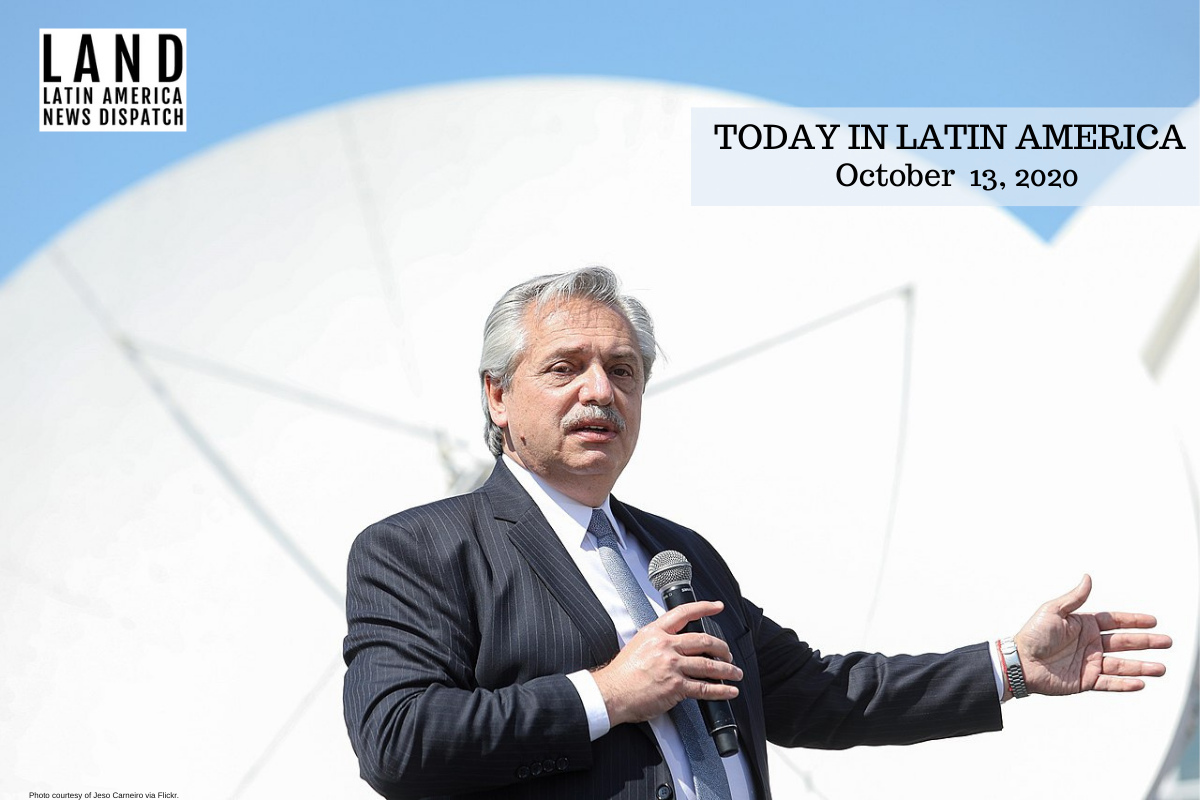ARGENTINA: Massive anti-government protests took place across several cities in Argentina on Monday. Protesters rallied against government coronavirus measures, judicial reform and the removal of three judges that were investigating former President Cristina Kirchner. She is linked to nine different corruption cases during her time as president, and serves as the current vice-president of President Alberto Fernández.
Monday marked the eighth demonstration against the Fernández administration since the national quarantine began. The previous protests were held between the months of June and September. President Fernández monitored the protests from the presidential residence in Buenos Aires. Fernández insisted that the massive protests would not change his policy in addressing the coronavirus pandemic or the economic crisis.
HEADLINES FROM THE WESTERN HEMISPHERE
SOUTHERN CONE
URUGUAY: Four officers were removed from their posts on Monday after shooting a 16-year-old teenager. The victim was traveling in a car with four underage passengers and two adults who refused to stop at a transit checkpoint. The officers shot at least seven times at the car, injuring the victim. No weapons were found in the car, and authorities are investigating the incident.
THE ANDES
COLOMBIA: The Indigenous communities of the departments of Nariño and Cauca marched to the city of Cali on Monday in a national “Minga” to request a meeting with President Iván Duque. The government sent a delegation of ministers to listen to the protestors. Indigenous organizers warned the peaceful march would continue to Bogotá if President Duque did not attend the meeting. Indigenous leaders hope to discuss the “extermination” of their communities and the centralization of power. Senator Feliciano Valencia called the Indigenous situation “critical” with the country moving towards a dictatorship.
#Minga2020
Hoy resistimos y caminamos de manera pacífica La Minga Social y Comunitaria.#VivaLaMinga pic.twitter.com/67CFk69VR4— Feliciano Valencia ? (@FelicianoValen) October 12, 2020
PERU: President Martín Vizcarra denied on Monday newly revealed allegations of corruption during his governorship of Moquegua. According to an anonymous witness working with prosecutors, Vizcarra received $280,000 in payoffs from a construction company working on a public infrastructure project before he became president. Vizcarra credits his successful fight against a “construction club” of corruption with links to the government as the reason for the accusations.
THE CARIBBEAN
DOMINICAN REPUBLIC/HAITI: Migration officials from the Dominican Republic and Haiti met to initiate conversations on the large number of undocumented Haitians migrating and smuggling goods to the Dominican Republic. Dominican Director of Migration Enrique García stated that the conversation should lead to a bilateral agreement. He pointed out that it was important for both countries to work together to find solutions to the problems occurring at the countries’ border. He also applauded the attitude of Joseph Ciancialli, his Haitian counterpart, who recognized the problems caused by undocumented migration. Both García and Ciancialli seemed willing to sign certain agreements, protect the border and combat illegal migration and trade.
CENTRAL AMERICA
HONDURAS: Honduras received two mobile hospitals from Turkey to treat COVID-19 patients in Choluteca and Santa Rosa de Copán, in the south and east of the country. The two hospitals are part of the seven hospitals that Strategic Investment of Honduras (Invest-H) bought. The first two mobile hospitals that arrived in July, although installed, have not been put to use yet due to several mechanical breakdowns. Civil society organizations criticized the purchase for the exorbitant price of $48 million for the two mobile ships, leaving Invest-H’s ex-executive director Marco Bográn investigated for corruption.
NORTH AMERICA
MEXICO: A group of women activists accusing political leader Porfirio Muñoz Ledo of sexual abuse took their protests to Morena’s headquarters, in Mexico City. Muñoz Ledo is one of the founders of the Party of the Democratic Revolution. Over the past couple of days, several women have shared their testimonies and accused Muñoz Ledo of sexual harassment. The legislator denied these accusations and instead blamed his opponent for provoking and spreading lies about him. Muñoz Ledo claims he is the rightful head of the political party, and that he is a “family man” who has always stood by women.
***



